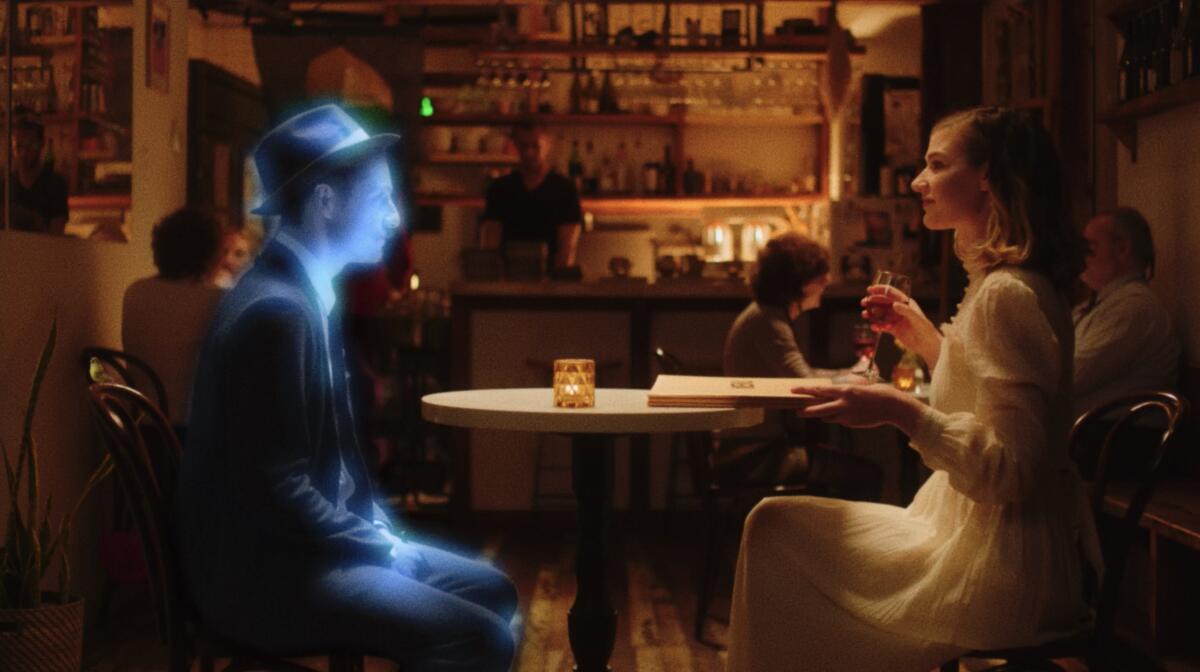‘Strawberry Mansion’ is heartfelt, playful and weird (in a good way)
Hello! I’m Mark Olsen. Welcome to another edition of your regular field guide to a world of Only Good Movies.
Only good movies
Get the Indie Focus newsletter, Mark Olsen's weekly guide to the world of cinema.
You may occasionally receive promotional content from the Los Angeles Times.
Two powerhouse retrospectives began in Los Angeles this week, and for anyone going back to theaters, they are both great examples of what a tremendous overall experience going to the movies can be. Besides providing the opportunity to see landmark films in the setting for which they were made, the events will feature beautiful rare film prints along with conversation, context and new perspectives. During the next few weeks, there will be multiple times the two programs will make people (by which I mean me) wish they could be in two places at once.
The UCLA Film & Television Archive spotlights “Pioneers of Queer Cinema” through March 28 to celebrate the ongoing preservation of LGBTQ+ moving images. Things begin tonight with Gus Van Sant in attendance for a Q&A following a screening of his 1986 debut feature, “Mala Noche.”
Other guests include director Gregg Araki and actor Mike Dytri for a conversation moderated by filmmaker Sean Baker after a screening of 1992’s “The Living End”; director Jennie Livingston, documentary participants Sol Williams and Freddie Pendavis, and producer Natalie Hill with 1990’s “Paris Is Burning”; director Rob Epstein in conversation with John Cameron Mitchell following 1984’s “The Times of Harvey Milk”; director Jan Oxenberg with 1975’s “A Comedy in Six Unnatural Acts”; filmmaker Cheryl Dunye with 1996’s “The Watermelon Woman”; filmmaker Donna Deitch with 1985’s “Desert Hearts”; and more.
The Academy Museum launched “Carnal Knowledge: The Films of Pier Paolo Pasolini,” a centennial tribute to the Italian poet, filmmaker and provocateur that runs through March 12. An openly gay man and outspoken cultural critic, Pasolini was murdered in 1975 at age 53 shortly before the release of his epically unsettling “Salò, or the 120 Days of Sodom.” Other films in the series include 1962’s “Mamma Roma,” 1964’s “The Gospel According to St. Matthew,” 1964’s “Love Meetings,” 1968’s “Teorema,” 1971’s “The Decameron” and more. Most films are being presented in preserved 35 mm prints from Cinecittà in Rome and Cineteca di Bologna.
This week on “The Envelope” podcast, Yvonne Villarreal spoke to Kieran Culkin about his role on “Succession” as Roman Roy, a playboy rich kid who suddenly finds he has to take himself and his future much more seriously.
As intense as the show can be, Culkin can be relied on for comic relief. “To me, the whole show has humor to it. Everything,” he explained. “And anything that is dark or sort of hurtful can’t be impactful without it being somewhat funny to me. Some of the hardest stuff to watch in the show is Tom and Shiv’s relationship, and I find myself laughing because it is kind of painful.”
And keep an eye out for invites to upcoming Indie Focus screening events. We will mix and match with two recent Sundance hits: an in-person screening and Q&A for “Master” with writer-director Mariama Diallo, and a virtual event for “Fresh” plus a conversation with director Mimi Cave and stars Daisy Edgar-Jones and Sebastian Stan.
Enjoying this newsletter? Consider subscribing to the Los Angeles Times
Your support helps us deliver the news that matters most. Become a subscriber.
‘Strawberry Mansion’
Co-directed by Kentucker Audley and Albert Birney, “Strawberry Mansion” is a bundle of contradictions, whimsical and inscrutable. Audley plays James Preble, an auditor of people’s dreams in the future. When he is assigned to an aging artist, Arabella Isadora, he finds himself drawn into her life. The film is in limited release and on VOD Feb. 25.
Audley has really been an undersung MVP of the independent film world for years. As an actor, he has a stalwart presence in films such as Amy Seimetz’s “Sun Don’t Shine,” Dustin Guy Defa’s “Bad Fever” and Charles Poekel’s “Christmas, Again.” He directed a number of films including “Team Picture” and “Open Five,” and he founded the website NoBudge, which gives a platform to films that might not otherwise be able to reach a wider audience. His isn’t the kind of work that wins big awards, but he deserves recognition as an inspiration and a low-key people’s champion.
For The Times, Carlos Aguilar wrote, “The imaginative directors confect a realm of tactile magic, with Kafkaesque flourishes, through the ingenious handcraftsmanship of practical elements and low-fi effects. A spiritual disciple of Michel Gondry’s ‘The Science of Sleep’ and Spike Jonze’s ‘Being John Malkovich,’ their brainchild brims with staggering originality. … With endless inventiveness reminiscent of the tangible wonderment achieved by cinematic forefathers Georges Méliès or Ray Harryhausen, ‘Strawberry Mansion’ is one of the most unique American independent films to open its doors in recent memory. Only time will tell if it can attain the cult status that its charming idiosyncrasy most definitely merits.”
For the New York Times, Amy Nicholson called the film “a dollhouse constructed on a fault line,” adding, “The story arc is obvious: Entering Bella’s brain will awaken Preble’s own. What’s startling is Audley and Birney’s playful, handmade ingenuity. To fully describe it would spoil the surprises. (As a teaser, one 15-second gag involves Preble and Bella transforming into beets.) Suffice it to say that the filmmakers’ reveries are so meticulously designed that the audience trusts their steady vision even when Birney, in a cameo, shows up as a saxophone-playing frog.”
For the New Yorker, Richard Brody wrote, “The no-holds-barred, extravagantly playful methods by which Audley and Birney conjure the audacious yet coherent tale of supernatural menaces and splendors are the movie’s prime achievement. Its critical drama of corporatized minds and its romantic one of gothic reverberations remain somewhat on the surface; its fantasies fall short of the furies of hidden desires that the cinematic surrealism of Buñuel brought to life, with simpler methods and riskier clarity. Rather, the film’s low-budget virtuosity comes off as an end in itself — as a vital example of possibilities untapped, as an act of resistance to reclaim fantasy for independent filmmaking, for imagination that pays no rent to the overlords of intellectual property and owes no fealty to the sanctimonious propaganda of their addictive fandom.”
For the Hollywood Reporter, Jourdain Searles wrote, “For much of the runtime, the events of the film are so low-stakes that it’s a bit shocking when the plot kicks in and changes the tone. … The point that the film is trying to make can be taken as lightly or as seriously as one likes. What Audley and Birney seem to want most is for audiences to allow themselves to be overtaken by their deliberately childlike approach to storytelling. At its heart, ‘Strawberry Mansion’ is an intentionally light respite from the painful times that we’re living in right now. As other independent films try to capture this cultural and political moment, Audley and Birney are more interested in presenting a tale that is timeless. It’s a candy-colored storybook that wants nothing more than to put you at ease.”

‘Dog’
Co-directed by Channing Tatum and Reid Carolin from a screenplay by Carolin, writer of the Tatum-starring “Magic Mike” movies, “Dog” is a different kind of vehicle for the star. Tatum plays Jackson Briggs, a former U.S. Army Ranger with a brain injury who, in hopes of being reinstated to service, agrees to transport a military dog with PTSD named Lulu from Washington state to Arizona. The film is in theaters.
For The Times, Katie Walsh wrote, “The road-trip high jinks add a level of absurdity to the proceedings that keeps ‘Dog’ from ever getting too heavy or maudlin. Typically, movies about dogs are unrelenting tear-jerkers, but Tatum and Reid resist sentimentality, resulting in a film that’s refreshingly frank and surprising when the emotional moments do hit (and do they ever). … While some storylines could have used more care and attention, Carolin and Tatum’s directorial instincts bring a fresh approach to this type of film. It’s a pleasure to say that this is one good ‘Dog.’”
For the New York Times, A.O. Scott wrote, “‘Dog’ is unabashedly sentimental. A movie about a dog and a soldier could hardly be otherwise. Luckily, Tatum’s self-deprecating charm and Carolin’s script keep the story on the tolerable side of maudlin. It’s also circumspect about Lulu and Jackson’s experiences of war, which is vaguely understood as something horrible but also glorious. Neither one is as complex as a real dog or a real man would be, which makes the movie an easy watch, but at the cost of some credibility. It’s friendly and eager to please, but it won’t quite hunt.”
For Vulture, Alison Willmore wrote, “Maybe it’s too much to expect that Tatum’s directorial debut (he shares the credit with ‘Magic Mike’s’ Reid Carolin, who wrote the script) would pair its empathy for soldiers with any kind of reckoning when it comes to what those soldiers were sent out into the world to do. Tatum the actor and filmmaker may be savvier than the characters he tends to play, but that savviness extends to his own image, and ‘Dog,’ which features his first leading role since 2017’s ‘Logan Lucky,’ is a star vehicle first, a showcase for the red-blooded, blue-collar solidity Tatum is so good at exuding on screen. … ‘Dog’ isn’t a dumb movie; it just has a frustrating habit of playing dumb with all its intense, self-defeating caution when it comes to criticism of the military. But it fully understands the charm of its star, who’s repeatedly positioned across the hood of his vehicle at dusk, Lulu at his side, like an ad equally effective for beer, trucks, or West Coast tourism.”

‘A Banquet’
Directed by Ruth Paxton from a screenplay by Justin Bull, “A Banquet” uses supernatural and horror elements in its exploration of parenting and adolescent development. Holly (Sienna Guillory), a widowed mother, becomes understandably concerned when her eldest daughter, Betsey (Jessica Alexander), comes to believe she is under the spell of divine power and stops eating. The film is in limited release and on VOD.
For The Times, Noel Murray wrote, “What’s missing from ‘A Banquet’ is the kind of gut-level shocks and narrative payoffs that viewers might — not unreasonably — expect from a genre film. Aside from some bickering and eeriness, the movie’s pitch rarely varies. … But this is all by design. Paxton and Bull appear to be mostly interested in Holly’s feelings of failure as a mother and her worry that she’s lost her daughter forever. At one point, Betsey asks her mom, ‘What if this is just me now?’ and Holly’s mortified expression alone is plenty disturbing. Who needs ghosts or demons when parenthood can be so nerve-racking?”
For IndieWire, Kate Erbland wrote, “While not precisely a horror film, Paxton cleverly uses its expectations and ideas to build her story. It creeps, it chills, it gets under your skin, and though there may be nary a jump scare to be found, there are many scenes that happily hinge on the possibility that something (someone?) is just out of frame and ready to grab you. … ‘A Banquet’ is at its best when it burrows inside the confines of its nearly all-female cast — here, it seems, is a truly new take on what it means to live inside a woman’s skin — but continued attempts to contextualize the saga in other ways fall flat. Eventually, Betsey and Holly carve out a tiny space for two, holing up in a single room, bound together by pain and confusion, worry and wonder, but the results are far more famine than feast.”

Only good movies
Get the Indie Focus newsletter, Mark Olsen's weekly guide to the world of cinema.
You may occasionally receive promotional content from the Los Angeles Times.




